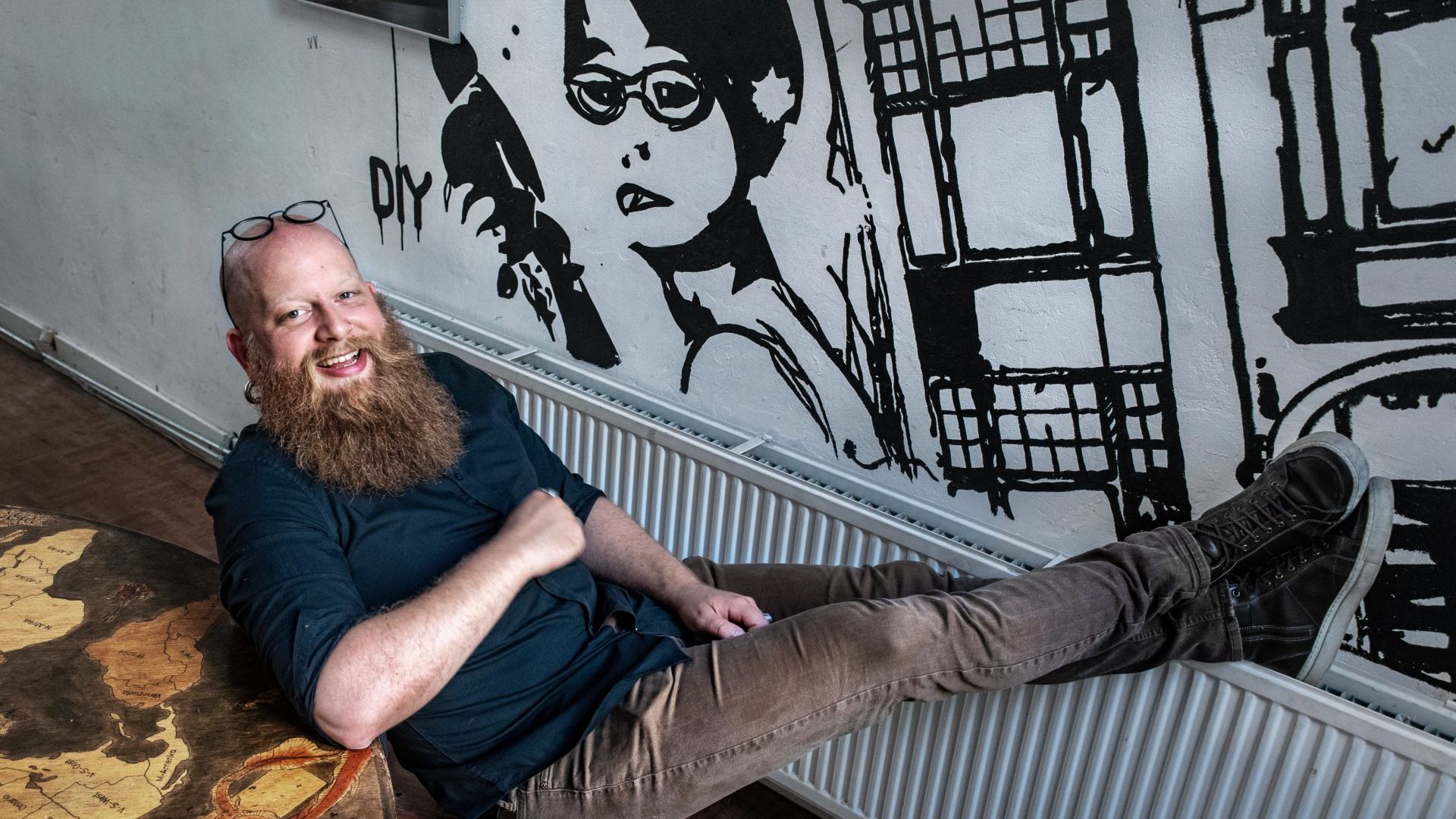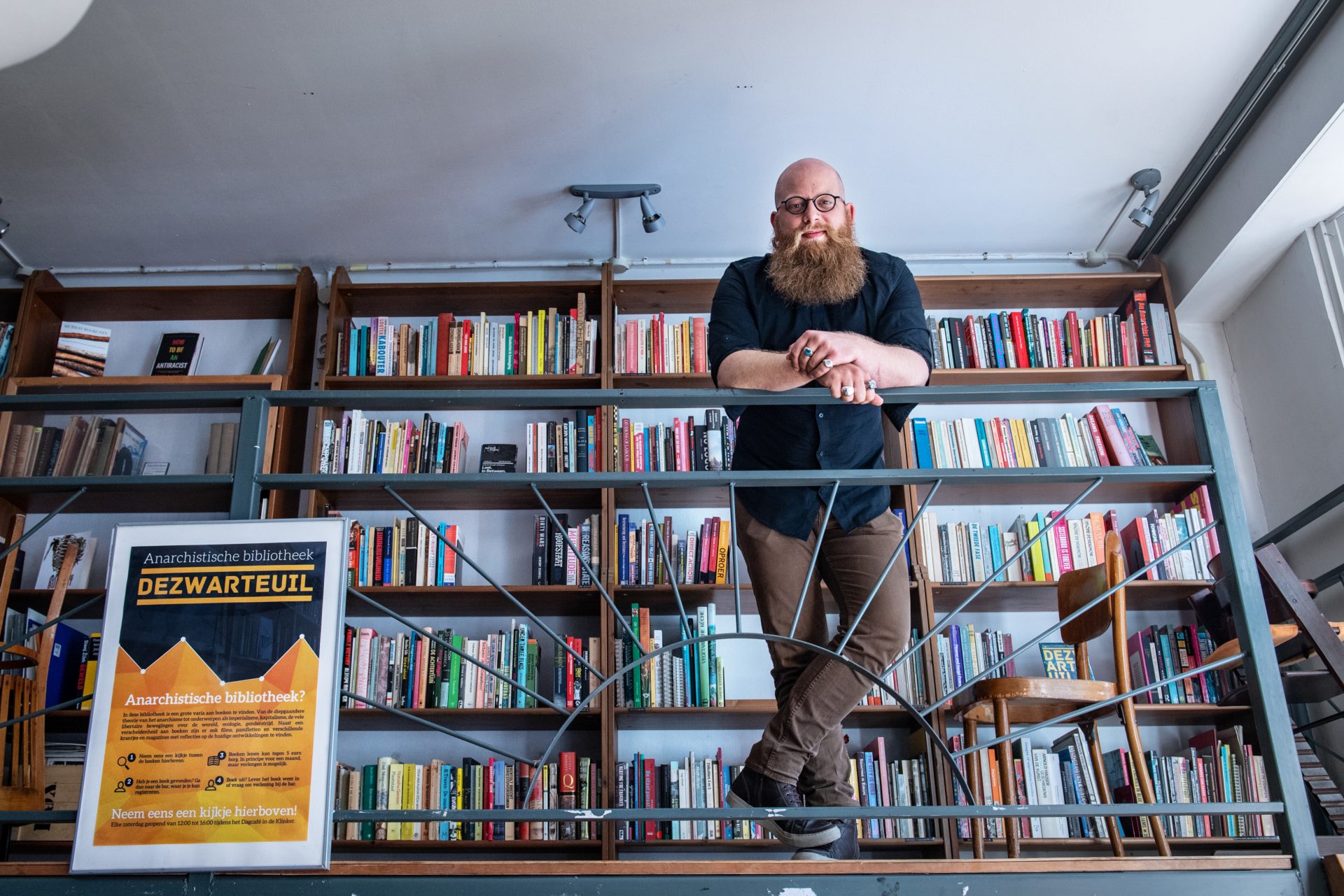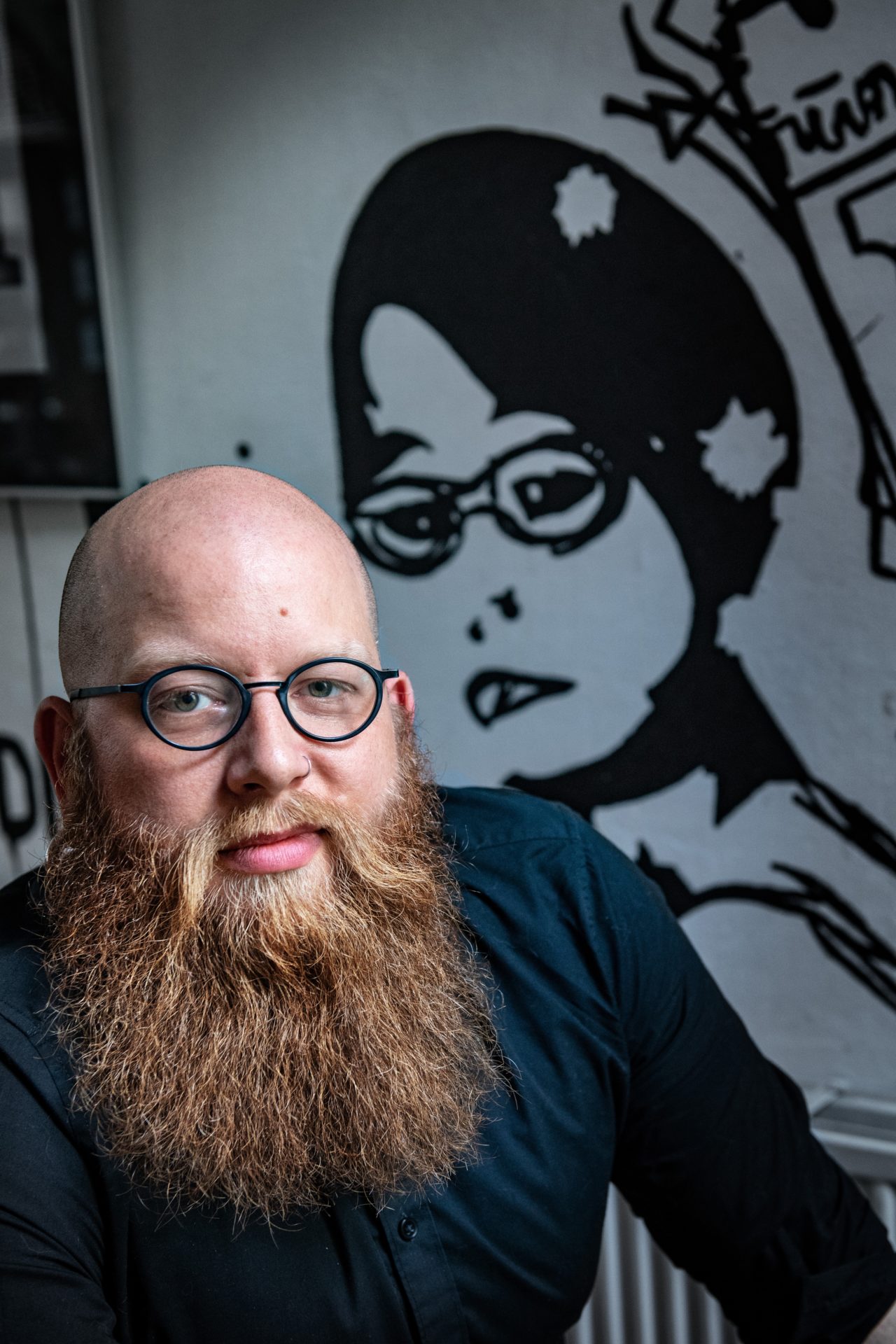Summer interview (3): ‘Activism and science both aim to change our view of the world’
-
 Mathijs van de Sande in De Klinker, the café of former squatters' stronghold Grote Broek. Photo: Bert Beelen
Mathijs van de Sande in De Klinker, the café of former squatters' stronghold Grote Broek. Photo: Bert Beelen
One day he goes viral for a left-wing speech and the next for a five-trombone performance. Associate Professor of Political Philosophy Mathijs van de Sande is a man of many talents. There is, however, one common thread in his life: the pursuit of a society that is as democratic and as inclusive as possible. ‘My biggest fear is that everything will stay the same once the corona crisis ends.’
Political philosopher, activist, socialist, vegan, member of the works council and associate professor: Mathijs van de Sande (35) is a man of many faces. During the coronavirus pandemic, he added musician to the list, a side of him many had not seen before. In a video that went viral on social media, he performed a special trombone rendition of Bella Ciao, an antifascist protest song, to celebrate May Day and 75 years of liberation.
The video is an arrangement of five trombone fragments, each of which he performed himself and then edited into a single video. ‘It took me a few afternoons to put it together,’ he says with a laugh. ‘I’ve been playing since I was a kid. What I love about this instrument is that is has a simple design – a single slide that you move up and down – but is deceptively hard to play. It also requires a lot physically, like arm coordination, breath control and lip condition.’
Van de Sande’s versatility inspires a multitude of conversations. With clear passion – interspersed with regular bursts of laughter – he explains in carefully chosen words what motivates him in life. Some two hours later, a picture materialises of someone who sees the world through a finely honed political lens, in which conflicting forces often try to manipulate the social balance of power.
This image is primarily reflected in Van de Sande’s work at Radboud University, where he researches prefigurative politics. ‘This concept describes how certain action groups – often anarchists like Occupy Wall Street but also the Arab Spring groups – protest in a way that aligns with what they hope to achieve. They create a kind of mini version of the ideal democratic society they advocate.’
‘Why do you have to justify your membership to an action group but not to a municipal council?’
As an associate professor of philosophy, he is fascinated by how protesters experience protests. ‘What makes the moment politically meaningful to them? It’s often about the outcome of the political process, such as ousting a dictator, but the protest itself is also valuable. Philosophers like Hannah Arendt have written about it.’
Van de Sande grew up in Rosmalen as the oldest of three children. His mother is a lecturer and his father is head of infectious disease control at the Regional Health Service (GGD). A progressive middle-class Catholic family is how he refers to them. He was an altar boy until the age of seventeen, but left the faith long ago. One of his sisters is a drama teacher, the other is an artist. ‘We all followed our passions,’ he says, ‘because we had a social safety net to catch us if we fell.’

His parents are far from activists, but they are socially involved. His father, for example, has long championed recognition of Q fever, the zoonotic disease that started in goats and affected many people in the province of Noord-Brabant. Van de Sande was first introduced to activism in Den Bosch, through the music scene during and after secondary school. He went to punk concerts in squatter bars – the classic road to anarchism and squatting in the 1980s and 1990s.
It was here that activism took hold. He is still active in the left-wing solidarity and anti-capitalist movement Doorbraak. Given his striking appearance – long auburn beard, shaved head, earrings – you could argue that Van de Sande is the quintessential left-wing academic that parties like the Forum for Democracy (FvD) so despise.
Activism and science: aren’t they like oil and water?
‘I actually think they have a lot in common. Both activism and science, philosophy in particular, aim to change our view of the world. I see political philosophy as a conceptual framework that attempts to question our everyday understanding of politics. This immediately makes it political in itself.’
‘What strikes me is that you’re expected to justify your membership to an action group but not, or to a far lesser extent, to a municipal council or a participational body. Aren’t they just as political?’
As a member of the works council, aren’t you part of the ‘system’? You also preach anarchy. Does this lead to any tensions?
[Laughing] ‘I’d like to think I preach radical democracy. Membership in the works council isn’t a conflict at all. Although I must admit I had my doubts when I was elected and certainly didn’t expect this. But my former professor Machiel Karskens said it was our duty as political philosophers to engage with politics in our daily work and immediate surroundings. He made a good point.’
Within the participational body, you voiced your concern about online proctoring [remote monitoring of students during exams using webcams and screens, Ed.]. Why?
‘I’d hoped the coronavirus would spark a debate about the whole notion of tests and exams, but instead the discussion centred on how we can continue to administer exams as usual. I prefer to see education as a learning process in which development is prioritised over achieving a certain standard’
‘For me, the proctoring file says a lot about how we as a society are dealing with the current crisis. Many people worry that things will be completely different after the crisis. My biggest fear is that everything will be exactly the same. If the crisis can’t change our neo-liberalism, with its insecurity and climate-destroying economy, what can?’
‘A neo-Nazi protest was planned right in front of De Grote Broek. That was pretty intense’
About eighteen months ago, Van de Sande took a vehement stance against groups like the PVV and FVD. ‘Sod off with your violent message, with your lies. How dare you even consider abusing a right [free speech, Ed.] that wasn’t intended for you and that you want to deny so many others of,’ he said during an anti-racist protest at De Grote Broek, the building where this interview was held. Van de Sande lived in this former squatter’s building on Van Broeckhuysenstraat in the centre of Nijmegen for years, both during and after his studies.
Those were pretty powerful statements. Rector Han van Krieken referred to it as a ‘tricky story’ and two right-wing philosophy students said it was undesirable for someone in your university position to have these beliefs.
‘You know, I don’t really want to talk about individual students or colleagues in an interview like this. As a professor, I support all of my students, even those whose political beliefs differ from my own. I would definitely serve as a thesis supervisor for a right-wing student, without a doubt. I realise I have a completely different perspective and that it may be hard for them to understand, but they study philosophy and philosophers create problems. We problematise things that may not be initially be considered problematic. That’s our job.’

Yet people understandably feel dismissed when you say freedom of speech doesn’t apply to right-wing beliefs.
‘That’s not what I said! Everyone is entitled to their own opinion, of course. And let’s not forget the context: as an activist I was protesting a neo-Nazi demonstration that was going to be held right outside De Grote Broek. It was pretty intense. What I was trying to explain is that freedom of speech was originally designed to protect citizens and political minorities from abuse of power. But in this context, members of a majority were using it to marginalise social minorities. My message was that this was never what the law was designed for.’
FvD supporters feel like a minority, claiming the establishment is against them.
‘That’s true. The forum makes good use of a kind of minority discourse, but I don’t think there’s any way a white man can claim to be a minority in our society. In fact, they’re overrepresented in the social and political debate. White South Africans who long for the days of Apartheid also claim to be a minority, albeit one born with power and wealth. That’s what it’s all about, as I think Thierry Baudet knows all too well.’
‘What’s so threatening about getting to know other perspectives?’
‘We can’t deny that white privilege exists in our society [white people are unwittingly favoured for their skin colour, Ed.]. Zwarte Piet protesters have been highlighting this problem for years in the Netherlands. They are rightfully claiming a place in society where stereotyped images lead to people of colour being more likely to be arrested and less likely to be invited to job interviews. Their experiences with inequality offer a radically different perspective of the world than the image of tolerance with which many of us were raised.’
How do you feel about the so-called decolonisation of education [scrubbing the curriculum of the dominant Western view, Ed.]?
‘I think curricula should offer broader perspectives on history and society. This not only means incorporating Eastern or African philosophies, but also examining how other countries and cultures view Europe. Decolonisation means critically examining how knowledge and science are historically entwined with the history of colonisation, exploitation and oppression. What’s so threatening about exploring these issues? Sure, it might make you question your world view, but isn’t that the point of philosophy and academia? If not, why bother going to university at all?’
Is there room for different perspectives within your own faculty? Research is currently being carried out on social safety concerns at the Faculty of Philosophy, Theology and Religious Studies.
Van de Sande is quiet for a moment. He appears to struggle to find the right words – a stark contrast with his previous eloquence and ease. ‘I honestly don’t know what’s going on in this specific case, so I can’t really comment on it. But I’ve seen first-hand that not everyone feels safe in the faculty, also from my position as a member of the faculty’s participational body. I think we need to discuss whether the faculty has done enough.’
Do you think you could have or should have done more?
‘I think everyone is asking themselves that question. It’s good to talk about how we can create an environment in which everyone feels safe. It’s about power relations and the competition that characterises the academic world and that makes people feel vulnerable. That’s not something you can just change overnight; it takes a long time, as do most of the things we talked about.’



